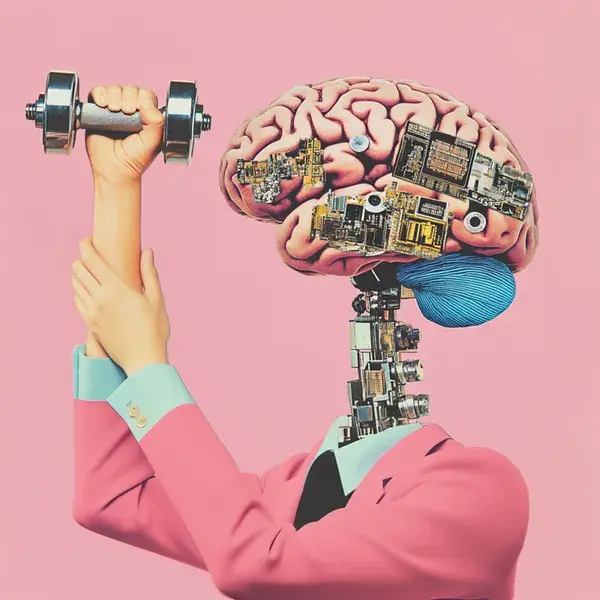Insights
VCs Say the Billable Hour’s Time Is Up—And the Opportunity Is Huge for IP Firms
Julie MacDonell
Aug 15, 2025

Table of Contents 
- AI Is Reshaping IP Law—But Patents and Trademarks Are on Different Timelines
- Corporate Counsel Is Moving Faster Than Law Firms
- Global Reach Without Global Overhead
- From Disbursement-Heavy, Low-Margin Work to ‘Software-Margin’ Profit
- Why SMBs Are the Biggest Untapped Opportunity in Legal
- What Market Expansion Could Look Like in IP
- Capturing the Next Billion-Dollar Client
- Protecting the Backbone of the Global Economy
- Why Trademarks, Not Patents, Will Drive Universal IP Protection
- The Mass-Market Shift in Trademarks
- The Decision Point for IP Firms
When Venrock venture capitalist Ethan Batraski—whose firm backed Apple, Intel, and Nest—predicts the collapse of the billable hour, the legal profession should take notice. He isn’t speculating. He’s pointing to the same market repricing that has already reshaped trading, advertising, and consulting. Law, he argues, is “one of the last great market inefficiencies in the modern economy.”
Batraski isn’t the only prominent VC sounding the alarm. Jason Lemkin, founder of SaaStr and investor in companies like Zoom, now calls Claude his “in-house counsel.” His recent 20VC podcast episode warned: “If all the existing law firms are dumb enough not to get with the program, they’ll lose business.”
BigLaw’s moat was built on three things:
Scarcity (making clients believe only a select few could deliver the work)
Associate leverage (billing junior lawyers at senior rates)
The perverse incentive that speed kills revenue (because under the billable hour model, faster work means fewer hours billed and therefore less money earned)
AI hits all three. Productivity gains of 30–60% are now possible in many practice areas — not by working harder, but by automating the repeatable, rules-based tasks that make up the bulk of associate hours.
For a $1.5 billion firm, $500 million in billables may come from work AI can now do instantly. That puts $250 million of revenue under immediate threat—not as a matter of efficiency, but of survival.
AI Is Reshaping IP Law—But Patents and Trademarks Are on Different Timelines
Artificial intelligence is changing every corner of IP practice, but it isn’t changing all of them in the same way.
Patents remain a large, lucrative market. They are the currency of high-stakes industries—pharmaceuticals, semiconductors, medical devices, aerospace—where a single claim can be worth hundreds of millions. AI now conducts global prior art searches in minutes, drafts preliminary claims, and produces competent office action responses at a fraction of the cost. But in patents, the decisive work isn’t mechanical. It’s in claim construction strategy, portfolio architecture, competitive positioning, and cross-jurisdictional filing plans. Those are high-consequence, context-heavy decisions where clients expect human counsel, and where experienced lawyers will remain indispensable.
Trademarks are another story. AI can now run comprehensive clearance searches across global databases, assess basic likelihood of confusion, and prepare filing-ready documents in seconds. For the majority of filings—whether for a local coffee shop or a multinational—this is the bulk of the work. Only complex disputes, nuanced enforcement strategies, or multi-jurisdictional brand battles still require sustained attorney involvement.
Corporate Counsel Is Moving Faster Than Law Firms
Corporate legal departments are already moving faster with AI than many of their external counsel. In trademarks especially, in-house teams now have mandates to bring work inside the company—outsourcing only when external firms can outperform on speed, cost, and accuracy. Liability-sensitive matters may still go to outside counsel, but everything else will stay in-house unless it’s delivered on a genuine value-based model. And “value” now means outcomes, not hours. This shift is why corporate legal is the fastest-growing segment for AI-powered trademark platforms like Haloo.
In patents, AI is a force multiplier for lawyers. In trademarks, AI is on the cusp of replacing much of the lawyer’s role in routine prosecution. One market will continue to support premium advisory practices. The other will see its bread-and-butter work vanish into software. For IP boutiques built on the billable hour for routine filings, the warning is clear: the transformation is already underway, and it’s coming faster for trademarks than for patents.
Global Reach Without Global Overhead
For decades, corporates relied on firms with lawyers in their target markets to run local trademark clearance work. That global footprint came with global overhead. Purpose-built AI platforms now deliver jurisdiction-compliant results across 195 countries without adding a single lawyer or square foot of office space.
Local expertise still matters—but only for high-stakes enforcement or litigation, where liability needs to be passed off to counsel on the ground. For everything else, software offers faster turnaround, greater accuracy, and dramatically lower cost.
From Disbursement-Heavy, Low-Margin Work to ‘Software-Margin’ Profit
In the traditional model, a firm spends about $9,000 in out-of-pocket disbursements to providers like Clarivate or Corsearch for five comprehensive trademark searches—little or no margin, and results can take days or weeks.
In the AI-native model, $10,000 buys 600 comprehensive searches—run in-house, delivered instantly, and benchmarked for higher accuracy see results. Even at the typical $1,500–$3,000 per search, that capacity delivers true software-level margins—far beyond what billable hours can produce.
Why SMBs Are the Biggest Untapped Opportunity in Legal
Current U.S. BigLaw economics are designed for a narrow market: roughly 5,000 large companies willing to spend $50,000+ annually on legal fees. Everyone else—32 million U.S. small and medium-sized businesses—either relies on solo practitioners or goes entirely without legal support.
Batraski calls this “market suppression,” not market selection. The same legal expertise that costs a Fortune 500 company $200,000 can be delivered to a mid-market client for $20,000—or less—if the firm abandons hourly billing and operates at software margins.
Firms can use AI-native economics to deliver value-based fees that improve client outcomes, introduce flat-fee pricing to reach more clients, and—most importantly—leverage their brand and reputation to offer direct-to-consumer software, self-serve, or lawyer-assisted products. That opens access to markets traditional economics can’t reach while maintaining profitability.
This is the legal industry’s largest unserved market, and it can only be reached profitably by going AI-native.
What Market Expansion Could Look Like in IP
In trademarks specifically, 93% of the world's 400 million SMBs never register their trademarks. Not because they don't want or value protecting their brand and business, but because the traditional process is slow, opaque, and priced for enterprise budgets only.
Imagine a global firm like DLA Piper embedding a white-labeled AI trademark search and filing tool directly on its website.
An SMB owner completes in seconds what once took a $1,500, two-day turnaround from a legacy vendor. They type, “We’re a coffee shop like Starbucks that roasts our own beans,” and the AI delivers a guaranteed-compliant goods and services ID list and a ready-to-file application instantly. The old way? A lawyer takes the intake by phone, manually looks up the correct IDs, drafts the application, and emails it back days or even weeks later.
The client can file directly or opt for a fixed-fee professional review. Either way, the firm captures a client who might otherwise never have engaged them. This creates a new revenue channel: product-led client acquisition at scale. Instead of SMBs doing nothing or trying to self-file or use LegalZoom, they enter the firm’s ecosystem early—and stay as their needs grow.
Capturing the Next Billion-Dollar Client
Consider Sara Blakely, who founded Spanx and grew it into a billion-dollar brand—yet started with a self-filed $150 trademark because traditional legal pricing shut her out.
Under an AI-native model, that first filing could have been done through a firm’s embedded platform, with a low-cost entry point and fixed-fee upsell.
That firm would have captured her as a client from day one and grown alongside her—managing every stage of brand protection, enforcement, and expansion as Spanx scaled globally. This is not about a missed filing fee; it’s about the lifetime value of a client whose legal needs span decades, jurisdictions, and a growing portfolio.
How many other billion-dollar brands never emerge—or never become your clients—because they can’t access basic IP protection at the start?
Protecting the Backbone of the Global Economy
The potential is staggering. If even 10% of the world’s unprotected small and medium-sized businesses registered trademarks through AI-native law firms, the addressable market would surpass the entire value of today’s global corporate trademark industry.
And the stakes go far beyond revenue. According to industry data, opening a restaurant requires an average investment of $175,000–$375,000 before serving the first meal. Starting a gym costs $200,000–$500,000 before signing the first member. Even a neighborhood coffee shop demands $80,000–$275,000 before the first cup is sold.
These aren’t just numbers—they’re enormous personal sacrifices. They represent second mortgages, drained retirement accounts, and years of 14-hour days causing family strain. Yet 85% of these businesses will face a trademark dispute that could shut them down overnight.
Haloo commissioned a survey of U.S. small business owners and found that 78% would have added a trademark search to a domain name purchase if it had been offered, even with a $9 domain. Most were willing to pay up to $500 for it. The desire to protect their investment is there. The barrier is access.
AI-native law firms can close that gap. They can offer trademark protection through self-serve APIs or flat-fee services—delivered profitably, at scale, and fast enough to stop most disputes before they start. In doing so, they strengthen the backbone of the global economy and redefine the business model of trademark law.
Why Trademarks, Not Patents, Will Drive Universal IP Protection
Batraski predicts AI will make IP protection “universal” and significantly expand the patent market. I see it differently. Patents are niche—highly technical, concentrated in industries like pharma, semiconductors, and biotech—and they depend on advisory-heavy, strategic work. That makes them ill-suited to the kind of mass-scale automation that’s now possible in trademarks.
Yes, AI patent startups are everywhere. But that doesn’t mean the patent market itself is about to explode. It means patents are easier to build generic AI tools for—structured data, standardized classifications, and searchable filings make it straightforward to create products that help lawyers. The catch: these tools still fit inside the billable-hour workflow. They speed up the work; they don’t replace the lawyer’s reasoning or strategy.
Trademarks are different. They’ve been harder to automate because clearance and drafting require integrating massive, messy datasets—common law sources, global registries, visual marks—and applying them with the nuance of a seasoned human search analyst. Matching that accuracy is a hard AI problem.
Haloo’s models were built over many years, using proprietary NLP and machine learning trained specifically for trademark law. Senior trademark examiners guided the process, refining the system until it could consistently outperform experienced human search analysts.
The Mass-Market Shift in Trademarks
In patents, AI may make lawyers faster. In trademarks, AI can now make lawyers optional for much of the work. With huge pent-up demand, trademarks are poised to scale into a true mass market with AI, while patents remain a smaller, high-touch advisory practice. Patents are inherently narrow—relevant only to a handful of specialized industries.
Trademarks are universal. Every business has a brand to protect, from the corner convenience store to a YouTube creator to a multinational. Even a 12-year-old selling virtual apparel on Roblox owns a brand worth safeguarding. Roblox alone generates $2.8 billion annually from virtual goods, with creators earning hundreds of millions.
In the digital economy, brands matter everywhere—and everyone needs protection. Amazon, Walmart, and Home Depot already operate on this assumption. Their brand registry programs require a trademark to unlock seller protections.
The Decision Point for IP Firms
The split is now clear:
AI-Native Firms—Built from the ground up for automation, fixed fees, proprietary data feedback loops, and scale into underserved markets.
Firms Using Legacy Vendors—Retrofitting AI onto human-paced workflows and per-search or hourly fee structures.
The former can profitably serve major corporate brands, leading law firms, and the global SMB market. The latter risk losing both corporate and emerging clients to faster, cheaper, outcome-driven competitors.
Venture capital is already betting that the billable hour is on borrowed time. This is no longer a theory—it’s happening. Clients are seeing results five to ten times faster, at a fraction of the cost, from AI-native platforms. Once they do, there’s no going back to paying for hours.
This isn’t just a billing model change. It’s a once-in-a-generation chance to serve the largest client base in the history of IP law. Those who act now will define the market’s future. Those who wait will be explaining to their partners why their clients left.
Haloo was built for this transformation. Our AI-native trademark search, watch, and workflow platform powers corporate legal teams, leading law firms, and naming agencies alike. Through our APIs, firms can embed professional-grade clearance and filing tools directly into their own branded website and client experience—capturing the massive underserved SMB market. To explore how this could work for your practice, visit haloo.ai or contact us to get a demo.











































